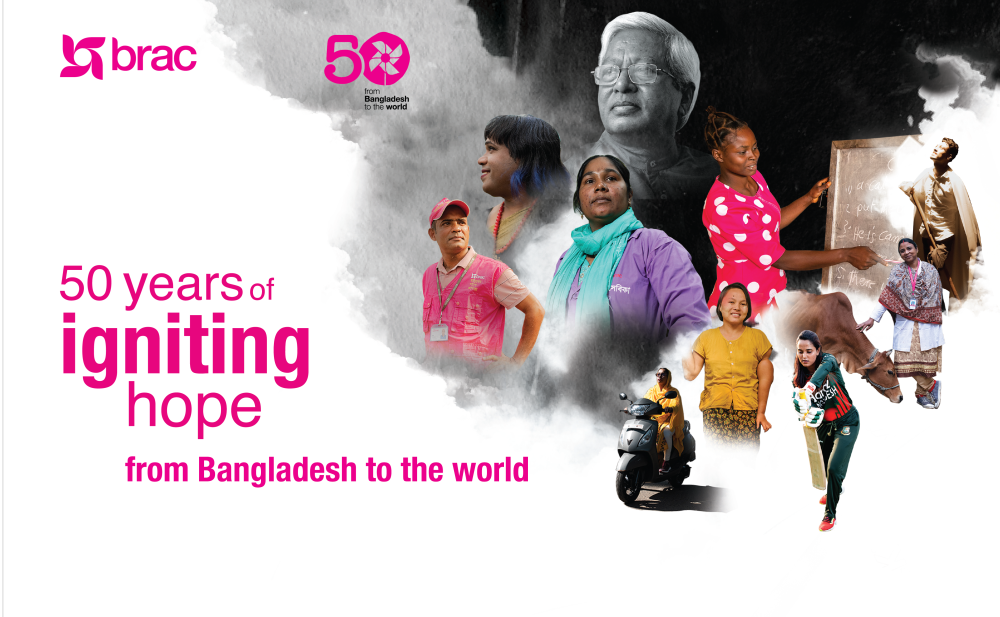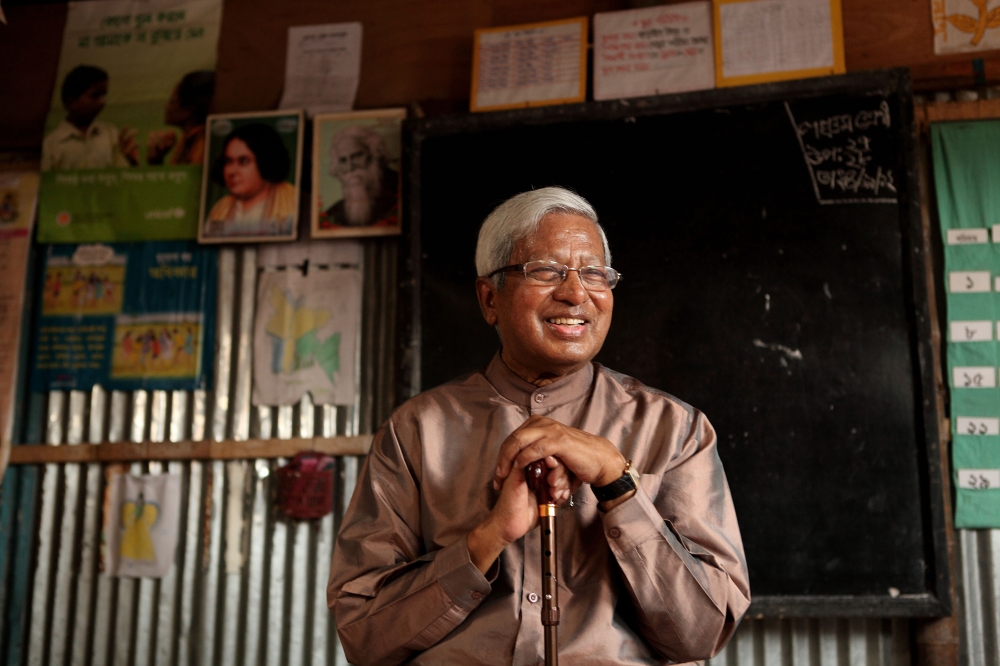

BRAC was born in a small village in Bangladesh in 1972, and is now a world leader in designing and delivering cost-effective, evidence-based programmes at scale.
Twenty years ago, BRAC took its first step beyond Bangladesh. Today, we work in 15 countries across Asia and Africa.
The organisation’s 50th anniversary is a celebration of solutions that are born and proven in the Global South, and the strength, ingenuity and courage of the 100 million people who partner with us to solve some of the world’s toughest challenges. The anniversary also offers an opportunity to hone our experience and evidence over the past five decades to take on more ambitious goals and create deeper, long-term impact in the future.
With origins and roots in the Global South and commitment to continuous learning, BRAC has a depth of experience and evidence that enables us to respond to the needs of diverse communities with humility and courage.
BRAC was ranked the number one NGO in the world for five times in a row since 2016 by the Geneva-based NGO Advisor, an independent media organisation committed to highlighting innovation, impact and governance.
Our vision
A world free from all forms of exploitation and discrimination where everyone has the opportunity to realise their potential.
Our mission
Our mission is to empower people and communities in situations of poverty, illiteracy, disease, and social injustice. Our interventions aim to achieve large scale, positive changes through economic and social programmes that enable men and women to realise their potential.
Our founder: Sir Fazle Hasan Abed


"People trapped in a cycle of destitution often do not realise their lives can be changed for the better through their own activities. Once they understand that, it is as if a light gets turned on.”
Sir Fazle Hasan Abed was born in 1936 in Bangladesh. While working as a Finance Director of Pakistan Shell Oil Company based in Chattogram, a devastating cyclone in 1970 claimed half a million lives in Bangladesh.
He travelled with friends and colleagues to Monpura, one of the worst-hit regions, to distribute relief. This was the beginning of a change in direction in his life. "The death and devastation that I saw happening in my country made my life as an executive in an oil company seem very inconsequential and meaningless,” he said.
A year later, the 1971 Liberation War in Bangladesh dramatically changed the course of his life. He left his job and moved to London, where he helped initiate Action Bangladesh and help Bangladesh in support of the Liberation War.
Early in 1972, when the war was over, he returned to the newly-independent Bangladesh, finding the economy in ruins. The return of 10 million refugees who had sought shelter in India during the war spurred urgent relief and rehabilitation efforts. Sir Fazle established BRAC to address the needs of refugees in a remote area of north-eastern Bangladesh, guided by a desire to help them develop their own capacity to better manage their lives.
Sir Fazle has been honoured with numerous national and international awards for his achievements in leading BRAC, including the Yidan Prize for Education Development (2019), Dutch Royal Knighthood (2019), LEGO Prize (2018), Laudato Si&039; Award (2017), Jose Edgardo Campos Collaborative Leadership Award, South Asia Region (2016), Thomas Francis, Jr. Medal in Global Public Health (2016), World Food Prize (2015), Trust Women Hero Award (2014), Spanish Order of Civil Merit (2014), Leo Tolstoy International Gold Medal (2014), CEU Open Society Prize (2013), Inaugural WISE Prize for Education (2011), Entrepreneur for the World Award (2009), David Rockefeller Bridging Leadership Award (2008), Inaugural Clinton Global Citizen Award (2007), Henry R. Kravis Prize in Leadership (2007), Palli Karma Shahayak Foundation Award for lifetime achievement in social development and poverty alleviation (2007), UNDP Mahbubul Haq Award for Outstanding Contribution to Human Development (2004), Gates Award for Global Health (2004), Gleitsman Foundation International Activist Award (2003), Schwab Foundation’s Social Entrepreneurship Award (2003), Olof Palme Prize (2001), InterAction Humanitarian Award (1998) and Ramon Magsaysay Award for Community Leadership (1980).
He is also recognised by Ashoka as one of the 'global greats' and is a founding member of its Global Academy for Social Entrepreneurship. In 2009, he was appointed Knight Commander of the Most Distinguished Order of St. Michael and St. George by the British Crown in recognition of his services to reducing poverty in Bangladesh and internationally.
Sir Fazle was a member of the Group of Eminent Persons appointed by the UN Secretary-General in 2010 to advise on support for the Least Developed Countries. He was named in Fortune Magazine’s List of the World’s 50 Greatest Leaders in both 2014 and 2017.
The many honorary degrees received by Sir Fazle Hasan Abed include those from Princeton University (2014), the University of Oxford (2009), Columbia University (2008) and Yale University (2007).
Despite all of his accolades, Sir Fazle embodied humility, exemplified by the way he was referred to simply as bhai, the Bengali word for brother.
Message from Shameran Abed, Executive Director, BRAC International
BRAC believes in pragmatic solutions that are grounded in local realities, and capable of addressing the complex challenges of poverty and inequality through a holistic approach. Across the world, we are partnering with communities, governments and other stakeholders to innovate programmes that integrate social and economic empowerment – working on multiple fronts to achieve real change, at scale.
We began our journey in Rwanda in 2019. Since then, we have grown to become one of the largest microfinance providers in the country. Our services are supporting marginalised people, especially women, towards greater self-reliance and resilience. We are looking to expand further in the coming days, creating sustainable livelihood opportunities and a more enabling environment for thousands of vulnerable girls and women. In Rwanda and across the region, we are committed to growing and deepening our presence to deliver impactful solutions for the people and communities we serve.
Message from Silent Clement Gonondo, CEO, BRAC Rwanda Microfinance company PLC
BRAC was one of the pioneers of microfinance since it started working in this sector in 1974. Microfinance is an integral part of BRAC’s holistic approach to development, equipping people who would otherwise be excluded from formal financial systems with the tools to invest in themselves, their families, and their communities.
Supporting Rwanda’s digital transformation vision, BRAC Rwanda Microfinance Company PLC has been the first BRAC International Microfinance entity to take steps in unlocking the promise of digital field applications. The client’s value proposition is at the core of our digital transformation efforts, with a particular emphasis on reducing the gender gap in women’s financial inclusion. Our operations are inspired by the Financial Sector Development Strategic Plan 2018-2024 of the Financial Sector Development Directorate in the Ministry of Finance and Economic Planning.
We would like to thank all our stakeholders and partners for working with us to help reach people, especially women in the most marginalised communities, to realise their potential.
BRAC International’s programmes
Born and proven in the south, growing roots and solving problems with people and communities.
For the last five decades, BRAC has worked to understand poverty and inequality and has built innovative and proven models of development interventions. Within the Global South, BRAC has expanded at scale in other lower-income countries with its distinctive integrated approach, adapted to each country's context. BRAC’s proven, practical solutions spark enterprise and lasting change. We equip people with the tools, opportunity, and skills to lift themselves out of poverty and reach their potential. Currently BRAC International implements eight core programmes.

